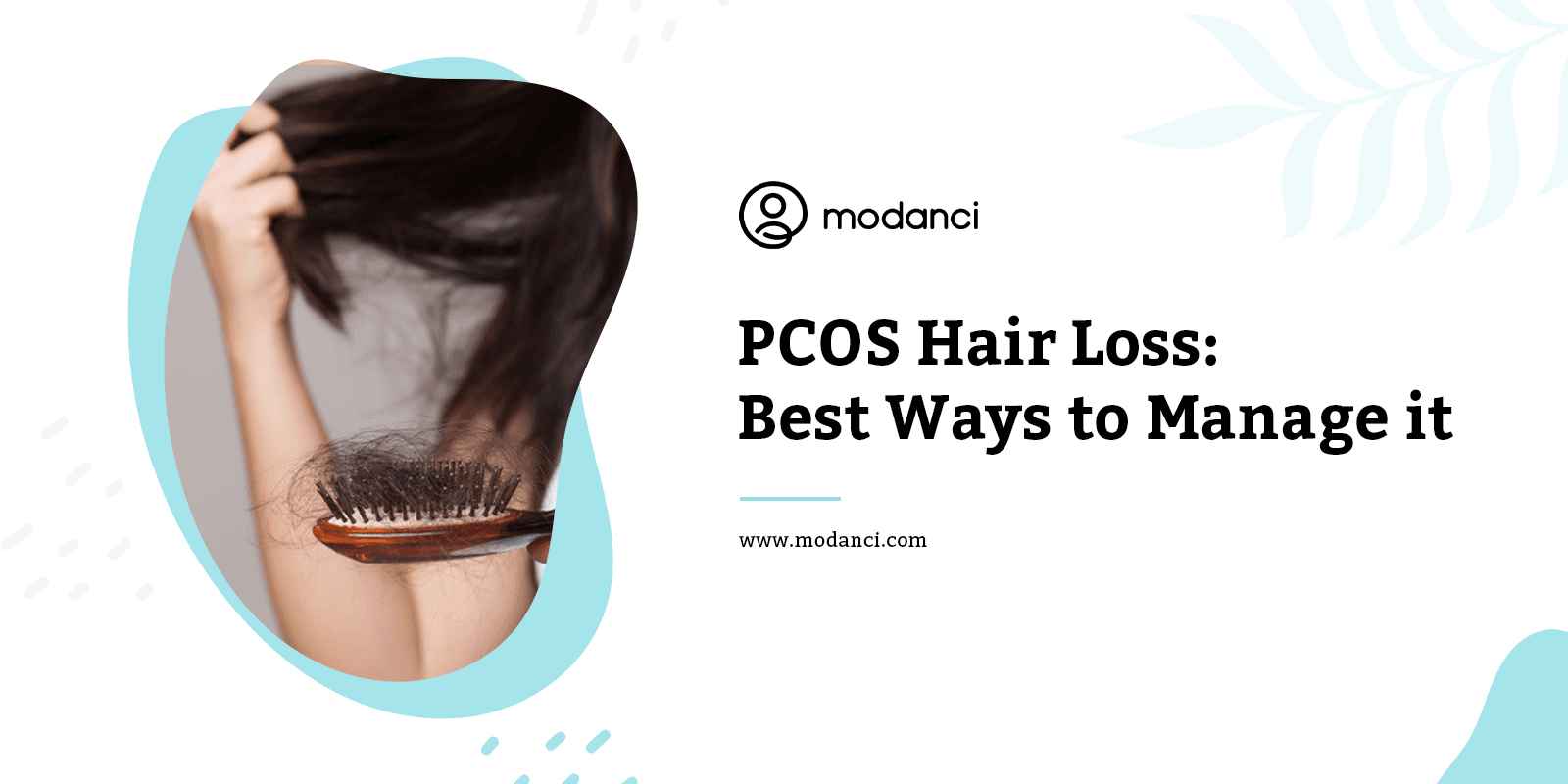Living with PCOS can be difficult, especially since it can lead to weight gain, acne, and hair issues, among other symptoms. PCOS can increase the amount of hair on your face or body, but it can also cause female pattern hair loss or hair loss from the top of your head. One out of ten women struggle with this condition.
Even though PCOS is a relatively common condition, it can severely impact an individual’s physical and mental health if not appropriately addressed. This article will look into the best ways to manage PCOS hair loss.
What is PCOS?
Polycystic ovarian syndrome (PCOS), a hormonal condition, can cause irregular periods and interfere with the ovaries’ normal operation. The Johns Hopkins Medicine Health Library describes PCOS as a condition where the ovaries overproduce the androgen hormones. Individuals of all genders produce androgens like testosterone.
Nevertheless, cisgender men often make more androgens than cisgender women do. At the commencement of puberty, androgens play a role in forming pubic and underarm hair. Additionally, some patients with PCOS grow many cysts in their ovaries; however, the illness can also exist without this complication. Cysts develop when an egg does not mature and release from the ovary during ovulation.
In addition to thinning hair, the cysts subsequently create too much androgen hormone, which results in several additional symptoms, including:
- Irregular menstrual bleeding
- Excess body hair growth
- Weight gain
- Acne
- Excess sebum (oil) on the skin
- Infertility
- Skin tags
- Dark, thick patches of skin
Why Does PCOS Cause Hair Loss?
Polycystic ovary syndrome (PCOS) is a hormonal disorder that can lead to hair loss due to several underlying factors. One primary factor is the increased production of androgens, such as testosterone, in women with PCOS. These elevated androgen levels can disrupt the hair growth cycle, leading to androgenetic alopecia or female pattern hair loss.
In PCOS, the excess androgens can shrink the hair follicles and make them more sensitive to the effects of dihydrotestosterone (DHT), a hormone derived from testosterone. This sensitivity causes the hair follicles to enter a shorter growth phase (anagen) and a longer resting phase (telogen). As a result, the affected hair follicles produce thinner, weaker hair strands more prone to shedding. Additionally, the high levels of insulin and insulin resistance commonly associated with PCOS can further contribute to hair loss by disrupting the normal functioning of hair follicles.
What are PCOS Hair Loss Treatments That Show Significant Success in Regrowth?
While managing PCOS is essential for addressing hair loss, several treatments have shown significant success in regrowing hair in individuals with PCOS. These treatments focus on hormonal regulation, improving scalp health, and stimulating hair growth. By targeting the underlying causes of hair loss associated with PCOS, these treatments offer hope for regaining hair density and restoring confidence in those affected by this condition.
Here are some natural ingredients that can help manage hair loss caused by PCOS:
1. Amla (Indian Gooseberry)
Amla is a powerful Ayurvedic herb known for its rejuvenating properties. It helps regulate hormonal imbalances and promotes hair growth. You can consume amla powder or juice regularly to support hair health. Alternatively, you can mix amla powder with coconut oil and apply it to your scalp as a hair mask to nourish the hair follicles and stimulate regrowth.
2. Bhringraj (False Daisy)
Bhringraj is often called the “king of herbs” in Ayurveda due to its potent hair benefits. It helps reduce hair fall, promotes hair growth, and improves hair texture. You can use bhringraj oil to massage your scalp regularly or create a hair mask by mixing bhringraj powder with yoghurt and applying it to your hair. These treatments can help strengthen the hair follicles and stimulate regrowth.
3. Brahmi (Bacopa Monnieri)
Brahmi is a herb known for its calming and stress-relieving properties. It helps balance hormone levels and reduces hair loss associated with PCOS. Massage your scalp with brahmi oil to nourish the hair follicles and promote regrowth. Consuming brahmi powder or capsules can help improve hair health from within.
4. Methi (Fenugreek)
Methi is a shared kitchen ingredient offering numerous hair health benefits. It helps control insulin levels, which can benefit PCOS-related hair loss. Soak methi seeds in water overnight and grind them into a paste. Apply the paste to your scalp and leave it on for about 30 minutes before rinsing off. Using methi hair masks can help reduce hair fall and encourage regrowth.
5. Neem (Indian Lilac)
Neem has antibacterial and antifungal properties that can help address scalp issues associated with PCOS, such as dandruff and fungal infections. Boil neem leaves in water, strain the liquid, and use it as a final rinse after shampooing your hair. This can help cleanse the scalp and promote a healthy environment for hair growth.
6. Shikakai (Acacia Concinna)
Shikakai is a natural cleanser that gently removes dirt and excess oil from the scalp without stripping the hair of its natural oils. It promotes a healthy scalp and strengthens the hair roots. Mix shikakai powder with water to paste and apply it to your hair. Leave it on for a few minutes before rinsing thoroughly. Regular use of shikakai can help reduce hair loss and improve overall hair quality.
7. Ashwagandha (Indian Ginseng)
Ashwagandha is an adaptogenic herb that helps reduce stress and regulate hormone levels. It can be beneficial for managing PCOS-related hair loss caused by hormonal imbalances. Consuming ashwagandha powder or taking ashwagandha capsules can help promote hair regrowth and improve overall well-being.
Conclusion
One possible adverse effect of PCOS is hair loss. Scalp massages and natural remedies are a few therapies you can employ to help your hair grow back.
It’s crucial to realise you’re not alone if you are experiencing hair loss due to PCOS. A community of people going through the same condition can be a comforting place to talk things out. It can prompt you to look into treatment possibilities you hadn’t previously considered.
Modanci’s Potensified Ayurvedic Solution For Hair Growth And Maintenance help combat hair loss issues caused by PCOS and aid hair growth. The kit includes a Handcrafted Organic Jatamansi Kokum Shampoo Conditioner Bar, an Ayurvedic Hair Oil, Hair Tablets, and Nasya Oil. Answer a few questions and discover personalised solutions to overcome hair loss problems!
FAQs
1. Will PCOS hair loss grow back?
Yes, PCOS-related hair loss can grow back with appropriate treatment and management. By addressing the underlying hormonal imbalances, managing insulin resistance, and adopting a holistic approach that includes lifestyle modifications, proper nutrition, and targeted hair care, it is possible to promote hair regrowth and improve the overall health of the hair follicles. However, individual results may vary, and it is advisable to consult with a healthcare professional for personalised guidance and treatment options specific to your condition.
2. Can you stop PCOS hair loss?
While PCOS-related hair loss can be challenging to stop completely, managing and reducing its impact through a comprehensive approach is possible. Addressing the underlying hormonal imbalances, driving insulin resistance, adopting a healthy lifestyle, and implementing appropriate hair care practices can minimise hair loss and promote healthier hair growth. Consistency in treatment and support from an Ayurvedic Vaidya can help effectively manage PCOS hair loss.
3. How can I stop PCOS hair loss naturally?
To naturally address PCOS-related hair loss, focus on lifestyle modifications such as maintaining a balanced and nutritious diet, regular exercise, stress reduction techniques, and sufficient sleep.
Incorporating natural remedies like herbal supplements (such as saw palmetto and fenugreek), essential oils (such as rosemary and lavender), and scalp massages can also help improve hair health. Consulting with your Ayurvedic practitioner can provide personalised guidance and recommendations for managing PCOS hair loss naturally.
4. Why does PCOS cause hair loss?
PCOS causes hair loss due to hormonal imbalances, specifically elevated levels of androgens (male hormones) like testosterone. These high androgen levels can disrupt the hair growth cycle, leading to increased hair shedding and thinning. Additionally, insulin resistance and inflammation associated with PCOS can further contribute to hair loss.
Read More:




